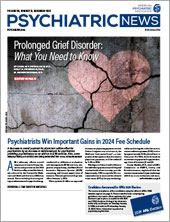I am often asked by medical students, “Why psychiatry? How did you know this was the specialty for you?” They look at me pensively as they begin to list the pros and cons of each medical specialty. So as I walked into my first continuity clinic of my fourth year of residency and prepared to see my first patient, the question came up again: “Why psychiatry?” Let me share my answer with you, but first, it may be helpful to have some background.
Although I have always been interested in human interactions, interpersonal relationships, and thought processes, I never pictured myself pursuing a career in psychiatry—that is, until my clinical rotations. My interest in psychiatry solidified during a specific patient encounter during my fourth-year child psychiatry elective.
I was on child consults, and my resident began de-briefing my attending and me on a consult she had just received. Staff was having a difficult time with this adolescent patient, and she was not cooperating with anyone. My attending and I walked into the room, and I could sense the tension between the patient, family, and staff. The patient was not very welcoming as we began asking her questions. A few minutes later, my attending asked the parents if she could speak with them separately. I felt a sense of relief, assuming I would be tagging along, until she said, “Why don’t you interview the patient while I speak to the family?” Internally, I began to panic. I was no expert in psychiatry, let alone child and adolescent psychiatry, so how was I going to build rapport with an adolescent who refused to speak with anyone? As my attending left the room, she gave me this look that I translated as “just trust me.”
Initially, I felt awkward, but I reminded myself that this patient is just as human as I am. She is going through a difficult time, and now strangers are constantly walking in and out of her room, probing about her current state—what a vulnerable place for anyone to be in. I engaged the patient in conversation, and I could see her personality shining through as she began deconstructing the wall she had built between herself and medical personnel. This sense of vulnerability and rapport is fundamental to our shared humanity. As I started to leave the room, my patient stopped me to ask if I could continue as her doctor. What an honor and privilege to be asked by someone to provide care, especially in the realm of mental health. The next day, my attending reached out to me and said, “While I was on morning rounds, your patient apologized to all of the medical staff, including me, for her behavior and asked if you would stop by before her discharge today. You’re a natural.”
In that moment, I knew psychiatry had a special place in my future. This encounter exposed a sense of vulnerability in me—one that has allowed me to relate to patients and those experiencing challenges in life as we have all faced hardships and what we perceive to be failures. This attending of mine, who remains a mentor, will always have a special place in my life. “You have the thing that can’t be taught,” she has often said to me. “You have the sparkle that will make you an excellent psychiatrist.”
So when I am asked now why I chose to enter psychiatry, I explain my desire to pursue a profession that focuses on healing. No other profession concentrates wholeheartedly on the uniqueness of each individual. I play a role in being able to help patients move forward and have a chance at living their best lives. I am passionately led to psychiatry because I cherish and thrive in its nonformulaic approach to medicine.
Above all, I devote myself to practicing the art of evidence-based psychiatry and the patients we serve. There is much work to be done, and I am grateful to care for those in need. So my question for you is “Why not psychiatry?” ■

